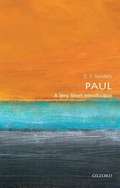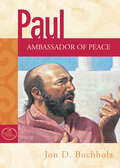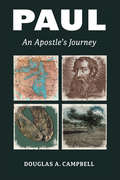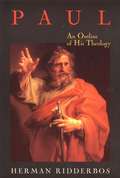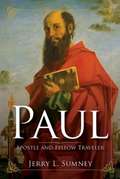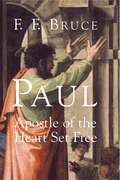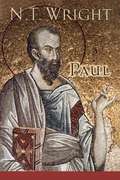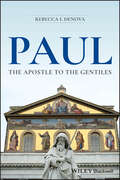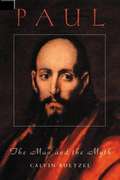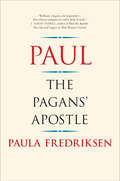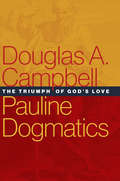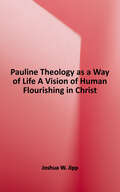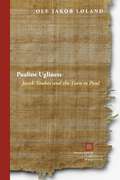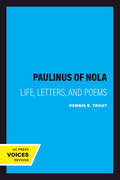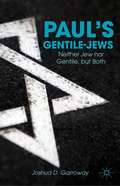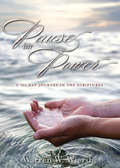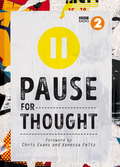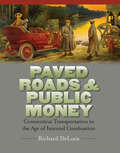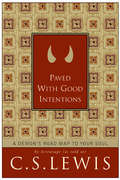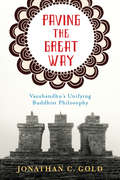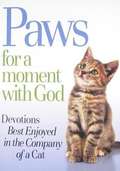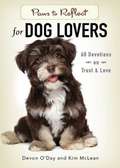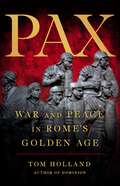- Table View
- List View
Paul: A Very Short Introduction
by E. P. SandersMissionary, theologian, and religious genius, Paul is one of the most powerful human personalities in the history of the Church. E.P. Sanders, an influential Pauline scholar, analyzes the fundamental beliefs and vigorous contradictions in Paul's thought, discovering a philosophy that is less of a monolithic system than the apostle's convictions would seem to suggest. This volume offers an incisive summation of Paul's career, as well as his role in the development of early Christianity. Both lucid and judicious, it is the most compelling short introduction to Paul now available.
Paul: Ambassador of Peace (God's People)
by Jon D BuchholzWho was Paul in the Bible?See how a powerful and loving Savior transformed his most vigorous adversary into his greatest missionary.Paul’s travels were full of danger, heartache, disappointment, and physical abuse, but they were also full of exhilarating joy over the gospel’s power to change hearts.If you’re wondering who Paul was, or want to know how Paul’s faith journey impacts your own, this book is for you!Paul is part of the God’s People series by Northwestern Publishing House. It’s a wonderful collection about the lives and times of some of God’s chosen people. Plots and settings have been taken directly from the Bible, and each book features beautifully detailed, full-color illustrations.
Paul: An Apostle's Journey
by Douglas A. CampbellDouglas Campbell has made a name for himself as one of Paul’s most insightful and provocative interpreters. In this short and spirited book Campbell introduces readers to the apostle he has studied in depth over his scholarly career.Enter with Campbell into Paul’s world, relive the story of Paul’s action-packed ministry, and follow the development of Paul’s thought throughout both his physical and his spiritual travels.Ideal for students, individual readers, and study groups, Paul: An Apostle’s Journey dramatically recounts the life of one of early Christianity’s most fascinating figures—and offers powerful insight into his mind and his influential message.
Paul: An Outline of His Theology
by Herman RidderbosNow back in print in a beautiful new paperback edition, this study by one of Europe's foremost New Testament scholars provides a comprehensive exposition of the teaching of the apostle Paul. Firmly grounded in a careful exegesis of the biblical text and crafted with constant reference to the wealth of scholarly study of Paul's writings, this volume is a standard for interpreters of Paul's thought and all students of the New Testament.
Paul: Apostle and Fellow Traveler (Symposium Ser. #Vol. 16)
by Jerry L. SumneyCovering the entire Pauline corpus the reader finds a man who was adept at persuasive arguments and providing theological answers to real and, often, thorny congregational issues. Readers have a keen understanding of Paul’s place in the early church, the relationship between church and synagogue, and the relationship between the teaching of Paul and that of Jesus. These discussions set Paul firmly within the church that existed before he joined, finding that he became an adherent to much that preceded him.
Paul: Apostle of the Heart Set Free
by F. F. BruceWritten by one of the best known and most respected biblical scholars of all time, this illustrated volume explores all of the primary themes in Paul's thought as they developed in the historical context of his life and travels. While Bruce's primary concern is to portray the life of the apostle Paul, he also examines the main themes of Paul's thought, set in their historical background and illustrated from his letters. Originally published in 1977, this new paperback edition of Paul will be used with profit by all who have an interest in the primitive church--from general readers to the most advanced biblical scholar.
Paul: In Fresh Perspective
by N. T. WrightThe letters of the Apostle Paul changed the world like no others before or since, and they continue to strike us afresh with their panoramic vision of human history and destiny.Preeminent New Testament scholar and churchman N. T. Wright here offers a fresh perspective on the Apostle Paul's content and convictions. Wright ranks Paul as "one of the most powerful and seminal minds of the first or any century," endlessly engaging and perennially elusive. Yet, with recent research, Wright argues, we can now sketch with confidence a new and more nuanced picture of the Apostle and the radical way in which his encounter with Jesus redefined his life, his whole thought-world, his mission, and his expectations for a world made new in Christ. The result: a masterful, engaging, and enlightening portrait that situates Paul in his time and for our own.
Paul: The Apostle to the Gentiles
by Rebecca I. DenovaA detailed exploration of both Paul the Apostle and his world, providing an understanding of how the Christian faith originated in the first centuries Paul the Apostle is often acclaimed as “the true founder of Christianity,” but many Christians are unaware of Paul's teachings in their historical context. Paul: Apostle to the Gentiles explores both Paul and his world in the first century, investigating how he integrated his values, politics, and daily life through his teachings on the nature of God, how humans relate to God, and how to live God's commandments. With a multidisciplinary Religious Studies approach and methodology, Rebecca I. Denova sheds light on the origin and evolution of the creation of a Christian “systematic theology” that became the basis for the establishment of Orthodox Christianity, the Catholic Church, and the Protestant Reformation. Accessible chapters provide the background and history of Judaism, analyze the Pauline epistles, and explore Paul's background as a Jewish Pharisee who became a believer in Christ within the context of the cities of the Eastern Roman Empire. Throughout the text, Denova offers insights into how Paul's engagement with the ancient world can help us understand the ways today's Christians articulate their own systems of meaning. Helping readers fully understand the development of Paul's theology and its importance over the centuries, Paul: Apostle to the Gentiles: Offers analyses of the Pastoral Epistles, I and II Corinthians, I Thessalonians, the Apocryphal Acts of Paul, Romans, and other key texts Explores the ways Paul's letters established Christian hierarchy, set rules for Christian assemblies, and were used to both include and separate Christianity from Judaism Discusses the shared concepts between Judaism and Greco-Roman religion, philosophy, and culture Includes “Excurses” between chapters, detailed examinations and summaries of important topics and different perspectives Contains numerous pedagogical tools, including historical timelines, maps and illustrations, definitions of concepts and terminology, references to traditional studies and recent scholarship, excerpts of ancient literature, and schematics of archaeological sites Covering both the world of ancient Christianity and the scholarly methods used in analyses of Paul's letters, Paul: Apostle to the Gentiles is an excellent textbook for undergraduate students taking courses on the origins and history of Christianity, as well as general readers interested in Paul's life and letters.
Paul: The Man and the Myth (Personalities of the New Testament Series)
by Calvin J. RoetzelWinner of Biblical Archaeology Society Award - Best New Testament Book "We are left to construct a portrait of Paul with only scraps of what was once a large and imposing canvas - a small collection of letters and a historical narrative written a generation after his death. This reconstruction focuses on important parts of the image that usually fall in the shadows, parts dealing with Paul's sexual asceticism, his preoccupation with holiness - holy Spirit, holy community, and holy ethos - the evolution of his theology, and his emergence as a legendary figure. Although I have tried to follow the strict rules of historical investigation, of necessity much guesswork is involved in any exploration of Paul's life... All of these efforts are attempts to deal with the gaps in the text, understood in the broadest sense to include not just Paul's written words but also the culture, social world, and political realities surrounding them." - From the Introduction
Paul: The Pagan's Apostle
by Paula FredriksenA groundbreaking new portrait of the apostle Paul, from one of today’s leading historians of antiquity Often seen as the author of timeless Christian theology, Paul himself heatedly maintained that he lived and worked in history’s closing hours. His letters propel his readers into two ancient worlds, one Jewish, one pagan. The first was incandescent with apocalyptic hopes, expecting God through his messiah to fulfill his ancient promises of redemption to Israel. The second teemed with ancient actors, not only human but also divine: angry superhuman forces, jealous demons, and hostile cosmic gods. Both worlds are Paul’s, and his convictions about the first shaped his actions in the second. Only by situating Paul within this charged social context of gods and humans, pagans and Jews, cities, synagogues, and competing Christ-following assemblies can we begin to understand his mission and message. This original and provocative book offers a dramatically new perspective on one of history’s seminal figures.
Pauline Dogmatics: The Triumph of God's Love
by Douglas A. CampbellThe eschatological heart of Paul&’s gospel in his world and its implications for todayDrawing upon thirty years of intense study and reflection on Paul, Douglas Campbell offers a distinctive overview of the apostle&’s thinking that builds on Albert Schweitzer&’s classic emphasis on the importance for Paul of the resurrection. But Campbell—learning here from Karl Barth—traces through the implications of Christ for Paul&’s thinking about every other theological topic, from revelation and the resurrection through the nature of the church and mission. As he does so, the conversation broadens to include Stanley Hauerwas in relation to Christian formation, and thinkers like Willie Jennings to engage post-colonial concerns. But the result of this extensive conversation is a work that, in addition to providing a description of Paul&’s theology, also equips readers with what amounts to a Pauline manual for church planting. Good Pauline theology is good practical theology, ecclesiology, and missiology, which is to say, Paul&’s theology belongs to the church and, properly understood, causes the church to flourish. In these conversations Campbell pushes through interdisciplinary boundaries to explicate different aspects of Pauline community with notions like network theory and restorative justice.The book concludes by moving to applications of Paul in the modern period to painful questions concerning gender, sexual activity, and Jewish inclusion, offering Pauline navigations that are orthodox, inclusive, and highly constructive. Beginning with the God revealed in Jesus, and in a sense with ourselves, Campbell progresses through Pauline ethics and eschatology, concluding that the challenge for the church is not only to learn about Paul but to follow Jesus as he did.
Pauline Theology As a Way of Life: A Vision of Human Flourishing in Christ
by Joshua W. JippPaul is known as a theologian, and indeed his writings yield rich theological insights. But Paul was foremost a missionary and a pastor who wrote to real people and churches. <p><p> In this fresh approach to Pauline theology, respected scholar Joshua Jipp brings Paul's pastoral concerns to the fore, specifically his concern for human flourishing in his congregations. Jipp argues that Paul's writings are best understood as invitations to a particular way of life, one that is oriented toward the supreme good of experiencing life in God through participation in Christ. For Paul, Christ epitomizes the good life and enables others to live it. While analyzing Paul's thought through this lens of well-being and flourishing, Jipp introduces conversation partners as points of comparison and contrast. He interacts with ancient philosophy and modern positive psychology, both of which also address "the good life." <p><p> This important and substantial contribution to Pauline studies covers issues such as transcendence, suffering and death, relationships, pursuit of Christian virtue, and moral agency. It will be a valuable resource for all students of Paul.
Pauline Ugliness: Jacob Taubes and the Turn to Paul (Perspectives in Continental Philosophy)
by Ole Jakob LølandIn recent decades Giorgio Agamben, Alain Badiou, and Slavoj Žižek have shown the centrality of Paul to western political and philosophical thought and made the Apostle a central figure in left-wing discourses far removed from traditional theological circles. Yet the recovery of Paul beyond Christian theology owes a great deal to the writings of the Jewish rabbi and philosopher Jacob Taubes (1923–1987). Pauline Ugliness shows how Paul became an effective tool for Taubes to position himself within European philosophical debates of the twentieth century. Drawing on Nietzsche’s polemical readings of the ancient apostle as well as Freud’s psychoanalysis, Taubes developed an imaginative and distinct account of political theology in confrontations with Carl Schmitt, Theodor Adorno, Hans Blumenberg, and others. In a powerful reconsideration of the apostle, Taubes contested the conventional understanding of Paul as the first Christian who broke definitively with Judaism and drained Christianity of its political potential. As a Jewish rabbi steeped in a philosophical tradition marked by European Christianity, Taubes was, on the contrary, able to emphasize Paul’s Jewishness as well as the political explosiveness of his revolutionary doctrine of the cross.This book establishes Taubes’s account of Paul as a turning point in the development of political theology. Løland shows how Taubes identified the Pauline movement as the birth of a politics of ugliness, the invention of a revolutionary criticism of the ‘beautiful’ culture of the powerful that sides instead with the oppressed.
Paulinus of Nola: Life, Letters, and Poems (Transformation of the Classical Heritage #27)
by Dennis E. TroutThis study offers a comprehensive reconsideration of the life and literary works of Paulinus of Nola (ca. 352-431), a Roman senator who renounced his political career and secular lifestyle to become a monk, bishop, impresario of a saint's cult, and prominent Christian poet. Dennis Trout considers all the ancient materials and modern commentary on Paulinus, and also delves into archaeological and historical sources to illuminate the various settings in which we see this late ancient man at work. This vivid historical biography traces Paulinus's intellectual and spiritual journey and at the same time explores many facets of the late ancient Roman world.In addition to filling out the details of Paulinus's life at Nola, Trout looks in depth at Paulinus before his ascetic conversion, providing a new assessment of this formative period to better understand Paulinus's subsequent importance within the influential ascetic and ecclesiastical circles of his age. Trout also highlights Paulinus's place in the swirl of rebellions and heresies of the time, in the pagan revival of the 390s, and especially in the development of a new genre of Christian poetry. And, he examines anew Paulinus's relationships with such figures as Jerome, Rufinus, and Augustine. Trout fully explores the complexity of a figure who has too often been simplified and provides new insights into the kaleidoscopic character of the age in which he lived.
Paul’s Gentile-Jews: Neither Jew nor Gentile, but Both
by Joshua D. GarrowayDrawing upon the concepts of cultural and linguistic hybridity developed by Homi Bhabha, Salman Rushdie, Mikhail Bakhtin, and others, Garroway suggests that the first generation of Gentile converts were uncertain whether they had become Jews or remained Gentiles in the wake of their baptism into Christ.
Pause for Power
by Warren W. WiersbeTopical. Relevant. Fresh. Pause for Power: A 365-Day Journey through the Scriptures will inspire readers to experience an unforgettable year of spiritual growth.Wiersbe Bible studies and commentaries have become a trusted resource for exploring scripture. Pause for Power continues that legacy. This unique devotional is designed to help readers discover spiritual insights through a simple, yet informative, approach to God's Word.In just a few minutes each day, readers will encounter powerful truths that can impact their daily lives. Features include:Select scripture readings that explore practical, everyday topicsThemed commentary from Wiersbe's popular "BE" seriesThoughtful questions that prompt personal reflectionA small prayer that carries a big ideaReaders will experience an unforgettable year in God's Word.
Pause for Thought
by Bbc Radio 2Highly designed and vibrantly colourful, this collection of scripts from BBC Radio 2's Pause for Thoughtshowcases the incredible insights that the different faiths in the UK today offer to people of all religions - and to those of none. Together, these pieces provide a guide to finding happiness and achieving psychological wellness, despite all the challenges we face. In both the selection of pieces and in the contemporary design, the emphasis is on pausing - on stopping readers in their tracks and offering new ways of perceiving and connecting with each other. The book features an exciting range of commentators with great public profile, such as comedians Shazia Mirza and Paul Kerensa and ex-Communard Richard Coles, with a Foreword by the show's presenters, Chris Evans and Vanessa Feltz. Each of the book's seven chapters has a theme, reinforcing the overall inspirational and positive message of the book: Live Boldly, Challenge Perceptions, Understand, Connect, Love, Be Thankful, Let Go. A superb gift as well as an inspiring self-purchase.
Paved Roads & Public Money: Connecticut Transportation in the Age of Internal Combustion (The Driftless Connecticut Series & Garnet Books)
by Richard DeLucaPaved Roads & Public Money describes the evolution of transportation systems in modern Connecticut. It is the second book in a two-volume study that begins with the bicycle craze of the 1880s, and ends with the efforts of the Malloy and Lamont administrations to revitalize Connecticut transportation in the twenty-first century. The story includes aviation, highways, bridges, ferries, steamboats, canals, railroads, electric trolleys, and water ports in Connecticut and along the multi-state travel corridor from New York to Boston. Drawing on a wide array of primary material, Richard DeLuca examines how land, law, and technology have shaped the state and its transportation systems, giving special attention to the state's two largest transportation monopolies: the New Haven Railroad and the Connecticut Department of Transportation. The book focuses on key events in the development of transportation and legislation. It is arranged chronologically, and by highlighting themes from each period shows the implications of the state's transportation history on current debates about infrastructure and funding. It features 50 illustrations and three appendices: population by geomorphic region, a list of controlled access highways, and a list of notable highway bridges.
Paved with Good Intentions
by C. S. LewisTemptation and Deception Made Easy The demon Wormwood first became famous through his correspondence with his uncle Screwtape, published in The Screwtape Letters. We are now privileged to peruse his field notebook from that demonic training session, complete with scribbles, notes, and excerpts from his uncle's letters. Wormwood's instructions, mission statements, and maxims for special occasions create a "best of Screwtape" that offers witty and cutting strategies for how best to corrupt a brand new Christian and steal him from the "Enemy" -- God. If the best defense is to know your opponent's game book, this is a must read for all those who want to retain their souls.
Paving the Great Way
by Jonathan GoldFeaturing close studies of Vasubandhu's Abhidharmakosabhasya, Vyakhyayukti, Vimsatika, and Trisvabhavanirdesa, among other works, this book identifies recurrent treatments of causality and scriptural interpretation that unify distinct strands of thought under a single, coherent Buddhist philosophy
Paving the Great Way: Vasubandhu's Unifying Buddhist Philosophy
by Jonathan C. GoldThe Indian Buddhist philosopher Vasubandhu (fourth–fifth century C.E.) is known for his critical contribution to Buddhist Abhidharma thought, his turn to the Mahayana tradition, and his concise, influential Yogacara–Vijñanavada texts. Paving the Great Way reveals another dimension of his legacy: his integration of several seemingly incompatible intellectual and scriptural traditions, with far-ranging consequences for the development of Buddhist epistemology and the theorization of tantra.Most scholars read Vasubandhu's texts in isolation and separate his intellectual development into distinct phases. Featuring close studies of Vasubandhu's Abhidharmakosabhasya, Vyakhyayukti, Vimsatika, and Trisvabhavanirdesa, among other works, this book identifies recurrent treatments of causality and scriptural interpretation that unify distinct strands of thought under a single, coherent Buddhist philosophy. In Vasubandhu's hands, the Buddha's rejection of the self as a false construction provides a framework through which to clarify problematic philosophical issues, such as the nature of moral agency and subjectivity under a broadly causal worldview. Recognizing this continuity of purpose across Vasubandhu's diverse corpus recasts the interests of the philosopher and his truly innovative vision, which influenced Buddhist thought for a millennium and continues to resonate with today's philosophical issues. An appendix includes extensive English-language translations of the major texts discussed.
Paws for a Moment with God: Devotions Best Enjoyed in the Company of a Cat
by Patricia Mitchell"May this little book of reflections, famous quotations, and classic and contemporary poems make you smile as you read Bible-centered devotions, each one drawn from the attitude, antics, and presence of our beloved cats... This book of reflections and devotionals will inspire and encourage... and if one of the blessings you have been given is the companionship of a wonderful cat, then cozy in together and spend a moment with God."
Paws to Reflect for Dog Lovers: 60 Devotions on Trust & Love
by Devon O'Day Kim McLean Devon O'DaySometimes human communication falls short in conveying spiritual truth. Sometimes God speaks through whatever means He chooses—and often he chooses our four-legged friends.Paws to Reflect for Dog Lovers offers 60 reflections for those who seek to grow spiritually by observing the unconditional love and devotion of our pups. This devotional offers a mix of humorous and heart-warming lessons in creative chapters such as these: You Can’t Judge a Cocker by Its Spaniel Footprints on the Pink Couch Growling for Grace The Hound of Heaven Cleanliness is Next to ImpossibleAs we stand in awe of humble animal hearts, we can learn important life lessons about overcoming mistakes, loving without judgment, persevering with wisdom and grace, resting in the arms of the One who loves us, and more.
Paws to Reflect: 365 Daily Devotions for the Animal Lovers Soul
by Devon O'Day Kim McLeanSometimes human communication falls short in conveying spiritual truth. God speaks through whatever means He chooses and often he chooses animals. Dogs teach unconditional love. The purr of a kitten can bring peace. Horses show us how to harness our strength with grace. Paws to Reflect offers gentle daily reflections for those who seek to grow spiritually by observing the animal kingdom and all the lessons it teaches.
Pax: War and Peace in Rome's Golden Age
by Tom HollandFrom a &“remarkably gifted historian&” (New York Times), the definitive account of the golden age of Rome -- an ultimate superpower at the pinnacle of its greatness The Pax Romana has long been shorthand for the empire&’s golden age. Stretching from Caledonia to Arabia, Rome ruled over a quarter of the world&’s population. It was the wealthiest and most formidable state in the history of humankind. Pax is a captivating narrative history of Rome at the height of its power. From the gilded capital to realms beyond the frontier, historian Tom Holland shows ancient Rome in all its glory: Nero&’s downfall, the destruction of Jerusalem and Pompeii, the building of the Colosseum and Hadrian&’s Wall, the conquests of Trajan. Vividly sketching the lives of Romans both ordinary and spectacular, from slaves to emperors, Holland shows that Roman peace was the fruit of unprecedented military violence. A stunning portrait of Rome&’s glory days, this is the epic history of the Pax Romana.
